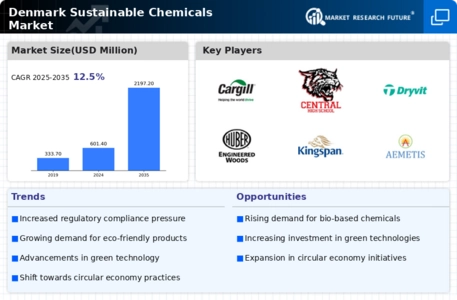Top Industry Leaders in the Denmark Sustainable Chemicals Market

Denmark, nestled in Northern Europe, has carved a unique niche in the global chemicals landscape. Driven by a strong commitment to sustainability and environmental consciousness, the Danish sustainable chemicals market is witnessing a dynamic and ever-evolving scene.
Strategies Shaping the Market:
-
Innovation as a Cornerstone: Companies are heavily investing in R&D to develop novel bio-based and recycled chemicals, cater to specific industry needs, and optimize production processes. Novozymes, with its world-leading enzyme technology, has partnered with companies like BASF to create sustainable polymers. Chr. Hansen, another Danish giant, focuses on bio-based preservatives and colorants for the food and beverage industry. -
Value Added Services: Players are moving beyond mere product offerings, providing technical expertise, life cycle assessments, and circular economy solutions. For instance, Kemira, a Finnish specialty chemicals company, collaborates with customers to optimize water and energy consumption in their production processes. -
Partnerships and Collaborations: Building strategic alliances is crucial for leveraging expertise, accelerating innovation, and accessing broader markets. BASF, for example, partnered with Danish start-up Biomega to produce bio-based succinic acid, a key building block for various consumer products. -
Sustainability Branding and Transparency: Companies are actively communicating their sustainability commitments, environmental footprint reduction efforts, and adherence to eco-labels. Gunvor, a Danish biofuel pioneer, highlights its commitment to responsible sourcing and traceability throughout its supply chain.
Factors Influencing Market Share:
-
Product Portfolio and Innovation Pipeline: A diverse and cutting-edge product range catering to specific industry needs holds a competitive edge. Companies like Haldor Topsøe, known for its catalysts and chemical technologies, continuously evolve their offerings to maintain their market position. -
Production Capacity and Infrastructure: Efficient and sustainable production facilities with low environmental impact are crucial for cost competitiveness. Companies like Perstorp, a leading producer of specialty chemicals, are heavily investing in renewable energy sources and waste reduction initiatives. -
Regulatory Landscape and Government Support: Stringent environmental regulations and government incentives for sustainable technologies play a significant role. The Danish government's ambitious "Green Deal" with its focus on clean technology and circular economy fosters market growth. -
Collaboration and Partnerships: Effective partnerships with academic institutions, research organizations, and other industry players accelerate innovation and market penetration. The Danish Bio Cluster (DBB) facilitates collaboration between research and industry, driving market growth.
Key Companies in the Sustainable Chemicals market include
-
Cargill Inc.
-
Mitsubishi Chemical UK Limited
-
BIO-KLEEN PRODUCTS INC.
-
BASF SE
-
Balfour Beatty PLC
-
DuPont Industrial
-
Bioscience
-
Dryvit Systems Inc
-
Anderson Corporation
-
Palmer Industries Inc.
-
SILVER LINE BUILDING PRODUCTS LLC
-
Thermafiber Inc.
Recent Developments
July 2023: BASF expands its Danish bio-ethanol production capacity, aiming to supply the burgeoning biofuels and chemicals market.
September 2023: A new startup, BioCircular Labs, secures seed funding to develop bio-based adhesives from agricultural waste, targeting the packaging industry.
November 2023: The Danish Technological Institute receives a grant to develop a pilot plant for bio-based acrylic acid production, a key building block for various polymers.










